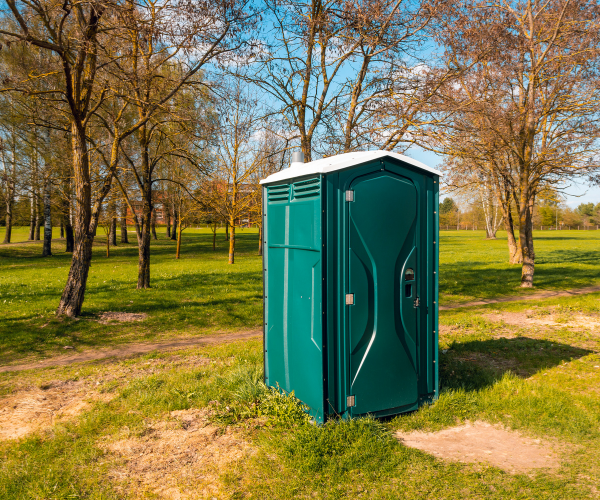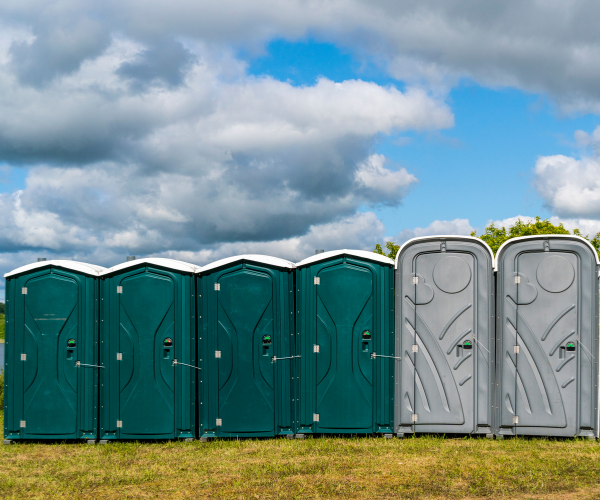Portable toilets offer several eco-friendly advantages which make them a sustainable option for sanitation needs. Firstly, they use significantly less water than traditional toilets, conserving this vital resource. Instead of flushing with gallons of water, portable toilets typically use biodegradable chemicals that limit the need for extensive water usage. This method not only saves water but also reduces the environmental impact associated with wastewater treatment processes. Additionally, many modern portable toilets are constructed with recyclable materials, further minimizing their ecological footprint. The chemicals used in portable toilets are formulated to break down waste efficiently, producing minimal emissions and odors. They are designed to be serviced and sanitized regularly, maintaining hygienic standards without affecting the natural environment. Furthermore, portable toilets reduce the infrastructure required for permanent restrooms, thereby limiting land use and construction impacts. Providing effective sanitation without permanent infrastructure aligns with the principles of sustainable development. In outdoor events, construction sites, or temporary setups, portable toilets contribute to a cleaner, safer environment by responsibly managing human waste. In summary, choosing portable toilets for your sanitation needs is a conscientious decision that supports water conservation and eco-friendly practices.

Portable Toilet Rentals in Black Mountain, North Carolina
Call today for a free quote (828) 576-3285
Portable Toilet
Fast, Easy, & 100% Free To Get Started
Over 20 Years Of Experience
With over 20 years of experience, our company is deeply rooted in Black Mountain and committed to delivering high-quality portable toilet services. We value our strong ties to the community and consistently prioritize customer satisfaction through professional and reliable services.
Unmatched Quality Service
Our exceptional service distinguishes us in the portable toilet rental industry. We focus on customer needs by providing impeccably clean units that comply with all health standards, establishing us as the trusted option in Black Mountain.
Fast and Reliable Delivery
We offer fast and reliable portable toilet delivery, ensuring our clients experience minimal wait times. Our team is dedicated to providing timely services so you can focus on hosting successful events in Black Mountain.
Clean Portable Toilet Solutions in Black Mountain
Call for a Free Quote Today
(828) 576-3285
As a locally owned company in Black Mountain, we pride ourselves on delivering dependable and reliable portable toilet services. Our commitment to service excellence covers all nearby areas, making us a favorite for events ranging from construction sites to parties, festivals, and weddings. We are known for our credibility, unwavering reliability, and the trust we have built in the community over the years. Whether it's a high-capacity festival or an intimate backyard gathering, we ensure clean and convenient access to top-notch sanitation facilities. Our solutions are tailored to meet the unique needs of every client, ensuring satisfaction and repeat patronage. Partner with us for your next event and experience the advantage of a locally trusted sanitation service provider. We take pride in offering a seamless and worry-free experience for all event organizers.


Our standard porta john rental units are durable and reliable for any commercial build site, housing development, public works project, or remodel job.Features include dome lighting, grated floors, and an “In-Use” locking mechanism for privacy and comfort. Regularly maintained, inspected, and cleaned by FusionSite at your location.

Developed as an alternative to full ADA-compliant restrooms, the Liberty is a spacious, wheelchair-accessible unit that can also be promoted as a family-sized restroom. Includes a patented flat-floor system for easy wheelchair access and maneuverability.Handrails, paper holder, and rotary latch are designed for simple, intuitive end-user operation.

Portable hand washing stations are essential for keeping your work site sanitary and clean. Features hands-free foot pumps, liquid soap, and paper towels.Perfect for job sites without water hookups, these units can handle hundreds of washes between services.
We Proudly Serve
Standard Portable Toilets
Our standard portable toilets offer dependable sanitation solutions for events and projects across Griffin Waste in North Carolina.
High Rise Portable Toilets
High rise portable toilets provide reliable access to sanitation on every level of construction projects in Black Mountain.
Restroom Trailers
Restroom trailers by Griffin Waste offer luxury and comfort for upscale events in Black Mountain.
Roll off Dumpsters
Griffin Waste roll off dumpsters offer efficient waste management solutions for construction sites in Black Mountain.
Septic Tank Cleaning
Griffin Waste provides reliable septic tank cleaning services in communities across North Carolina.
Grease Trap Cleaning
In Black Mountain, our grease trap cleaning service ensures cleanliness and hygiene for local businesses.
Fencing & Barricades
Griffin Waste's fencing and barricades service safeguards construction sites throughout North Carolina.
Residential Storage
Our residential storage solutions in Black Mountain provide safe, convenient space for your storage needs.
Black Mountain Portable Toilet
Getting a quote for your portable toilet needs has never been easier. Our user-friendly online system allows you to request a quote at your convenience. Simply fill out our quick form with your contact details and our team will get back to you promptly with all the information you need. Delivery of your portable toilet can be scheduled to suit your timeline, with flexible options to cater for last-minute changes. Whether you're planning a large festival or a small party, our efficient delivery system ensures your units arrive ready for use. Enjoy peace of mind with our no-hassle service that prioritizes your events whether they're in the heart of Black Mountain or the surrounding areas. Discover how convenient getting a quote and delivery can be by choosing us for your portable toilet needs today. Our team comprises industry experts committed to providing you with the best service possible, making your experience with us seamless and satisfactory.

The allure of Black Mountain is second to none, with its stunning outdoor attractions and vibrant community events such as the annual LEAF Festival. Our portable toilet services boast a local charm that perfectly complements the beauty and functionality required for all your gatherings. From outdoor celebrations to community events, like those near the historic Swannanoa Valley Museum, our reliable and clean facilities enhance guest experiences and ensure that sanitation is worry-free. By choosing our portable toilets, you're investing in a service that prioritizes convenience and quality behind the charming backdrop of Black Mountain. Our units are strategically placed for maximum accessibility and comfort, offering easy integration into your event setup. Optimize your event in Black Mountain with our seamless service that caters to all your portable sanitation needs. Our dedication to providing clean, dependable, and easily accessible toilets sets us apart from the rest, ensuring every occasion, big or small, runs smoothly.
Our company excels as the premier choice for portable toilets in Black Mountain due to our dedication to excellence and deep-rooted community involvement. Firmly established in North Carolina, we boast years of dependable service, consistently delivering reliability and quality. We offer advanced sanitation solutions that elevate any occasion, from intimate local events to grand celebrations. Our team takes pride in delivering personalized service, ensuring meticulous attention to every detail, which affirms our leadership in the portable sanitation sector. Choose us for the reassurance that your event's portable toilet needs are handled with top professionalism, care, and a strong community focus.
Swiftly and reliably, our company's portable toilet services excel in both speed and dependability in Black Mountain. We recognize that timely delivery is vital for smooth event planning, so our team ensures your units arrive swiftly, often ahead of scheduled times. Before each delivery, we meticulously inspect every unit to ensure peak functionality and cleanliness, reflecting our unwavering commitment to high standards. By partnering with us, you can be confident that your needs are met with efficiency and professionalism, making us the preferred choice for rapid portable toilet solutions. Our customers' success and satisfaction remain our top priorities, driving our dedication to consistently providing exceptional service.
Discover Our Portable Toilet in Black Mountain
Renting a portable toilet in Black Mountain is a straightforward process designed to make life easier for our clients. Begin with a quick visit to our website where you'll find forms conveniently placed at the top and bottom of the page, as well as multiple 'Get A Quote' buttons. Filling out the form is simple: provide your first name, last name, phone number, and email, and submit the request. Our team is dedicated to responding promptly, helping you choose the ideal portable toilet options based on your event or project needs. Alternatively, you can give us a call directly to discuss your requirements and get immediate assistance. We pride ourselves on delivering personalized service that caters to any sanitation needs, from large-scale events to smaller functions. Upon finalizing the details, our team handles the logistics, ensuring timely delivery and setup of the portable toilets at your specified location. This seamless process enables you to focus on other aspects of your event, confident that your sanitation needs are expertly managed. We commit to providing quick, reliable service, making the rental process as efficient and stress-free as possible.
Upon placing an order for portable toilets, our goal is to ensure swift delivery and setup to meet our clients' needs. Typically, the delivery timeframe ranges from 24 to 72 hours, depending on the size and nature of your event or project. We understand that some events require immediate attention, which is why we offer expedited services for urgent requests, often accommodating same-day deliveries wherever possible. When placing your order, our team will confirm the expected delivery schedule and keep you informed every step of the way. Our logistics team maps out efficient delivery routes, ensuring punctuality and reliability. Once on-site, our experienced personnel position the units strategically to maximize convenience and accessibility. Should you have specific delivery requirements, we are open to accommodating special preferences to ensure your complete satisfaction. We take pride in offering reliable services that align with your event's timeline, thus eliminating concerns about sanitation readiness. Partnering with us guarantees not only timely delivery but also the assurance of clean and functional portable toilets customized to support your needs at any time.
Yes, we proudly provide portable toilet services for a wide range of events and construction projects. Our offerings include luxury restroom trailers and standard porta potties suitable for festivals, sporting events, weddings, corporate functions, and family reunions, among others. We understand that each event is unique, which is why we offer tailored solutions that meet your specific sanitation needs. For construction services, we deliver robust units that can withstand the demands of any construction site. Our comprehensive service range includes ADA units, portable sinks, and hand sanitizer stations, ensuring accessibility and hygiene for every guest or worker. Additionally, our roll-off dumpsters and fencing and barricades provide essential support for managing large areas efficiently. Our commitment to quality and reliability has made us a trusted sanitation partner for various industries and event organizers. With a focus on customer satisfaction, we guarantee that your sanitation facilities are in perfect working condition throughout your event duration.

